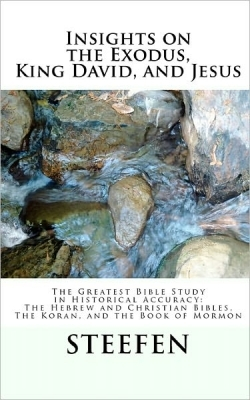
Insights on the Exodus, King David, and Jesus
The Hebrew and Christian Bibles, the Koran and the Book of Mormon
One generation passes its beliefs down to the next, either by word of mouth or by written documentation, and, as time passes, the stories are embellished and mixed with the histories of succeeding generations. They become a hybrid of personalities and politics, enriched and layered with wisdom, literary beauty, and lexicons of popular culture.
In Insights on the Exodus, King David, and Jesus, author Steefen insists that everyone—layman and theologian alike—must realize the importance of understanding (when it comes to our faiths) what is right under our noses in museums, in what he calls “The Post-Rosetta Stone Perspective.” He writes, “With Egypt’s Rosetta Stone deciphered…a wealth of knowledge and inspiration about Ancient Egypt has come to light. We can see the history of Biblical times better than before.”
Through careful research of different religious doctrines, such as the Christian and Hebrew Bibles, The Koran, and ancient Egyptian writings, he discovered parallels of characters and ideologies. For example, there is an uncanny resemblance between the story of Adam and Eve in the Garden of Eden and Egypt’s King Akhen-aten (who may have been Moses, too) and Queen Nefertiti. He writes,
Adam, Akhen-aten, and Eve, Nefertiti, did partake of the fruit of the tree of knowledge; and, it was a festival. Amen-Ophis III had a sed festival for his own 30th anniversary as pharaoh. Akhen-aten, formerly known as Amen-ophis IV, [whose name, Amen, we might have possibly adopted as a way to close prayer] had a sed festival about the fifth year of his reign. The defacing of names of the gods began in Year 5 of Akhen-aten’s reign. When one eats a piece of fruit, the fruit is destroyed. Ralph Ellis [revisionist historian] puts forth that the names of gods and the names of gods in the names of past pharaohs were forbidden fruit. Deleting history, as Akhen-aten was doing when he was chiseling out the names of gods not only from stone but from his name, and Nefertiti changing her name before he did, was the crime of Adam and Eve.
One cannot help but be enraptured by the immensity of Steefen’s task of trying to find a universal truth running through the world’s religions. His other writings include, but are not limited to, a memoir, From My Beginnings in New York, and a series of dramatic religious works, Water Bearing Fish. Unfortunately, Insights on the Exodus suffers from typos, grammatical errors, and style choices that are distracting from the overall narrative. Also, readers will find that the research appears scrupulous and the evidence provided seems irrefutable and convincing, but some of the theories presented are jumps in logic that bend fact with conjecture.
Reviewed by
Lee Gooden
Disclosure: This article is not an endorsement, but a review. The publisher of this book provided free copies of the book and paid a small fee to have their book reviewed by a professional reviewer. Foreword Reviews and Clarion Reviews make no guarantee that the publisher will receive a positive review. Foreword Magazine, Inc. is disclosing this in accordance with the Federal Trade Commission’s 16 CFR, Part 255.
